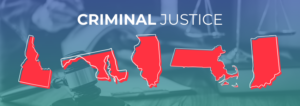State of Justice: September Cases in the Courts

Civil Rights
Maryland
Bethesda African Cemetery Coalition, et al. v. Housing Opportunities Commission of Montgomery County
The Maryland Supreme Court ruled that a municipal housing commission is not required to seek judicial review to sell a city-owned property that includes a Black cemetery that was paved over to create a parking lot in the 1960s, but that descendants and estates of those buried in the cemetery may seek equitable common law relief. A community organization advocating for the preservation of Black cemeteries had argued that the city could not sell the property without first receiving judicial approval, but the court ruled approval is not required and returned the case to the lower court to hear the group’s claims. In doing so, the state supreme court is allowingthe group to amend its complaint to include claims and seek relief.
North Carolina
Kinsley v. Ace Speedway Racing, Ltd.
The North Carolina Supreme Court ruled a racetrack can bring a claim against the state’s chief health officer stemming from its temporary closure following its repeated noncompliance with orders from the state’s secretary of health and human services to stop holding events that did not comply with the governor’s orders to limit crowd sizes in response to the COVID-19 pandemic. The racetrack argued that state officials ordered its temporary closure specifically because it repeatedly and publicly violated the crowd size order, and the state sought to make a public example of the racetrack. The court agreed that the racetrack’s claim that the state conducted “unlawful selective enforcement” of its order was plausible and returned the case to a lower court to be heard on its merits.

Criminal Justice
Idaho
State of Idaho v. Bryan C. Kohberger
The Idaho Supreme Court ruled that a high-profile murder trial will be moved from the rural county where a quadruple homicide was committed to the county containing the state’s capital city, Boise. The court approved the defendant’s request to move the trial’s venue due to concerns that the small population of the local community where the murders were committed would make it impossible for the defendant to receive a fair trial with a jury composed of members of the community.
Illinois
In a unanimous ruling, the Illinois Supreme Court ruled that the state’s cannabis laws have evolved to the point that the scent of cannabis smoke alone is no longer probable cause to justify the search of a vehicle by police. The ruling threw out evidence in two possession convictions that had occurred shortly after cannabis was legalized in the state and could have implications for any cases that arose from an officer initiating a search of a vehicle after smelling cannabis smoke.
Indiana
The Indiana Supreme Court ruled that four individuals accused of crimes should receive new trials after the individuals asserted that they were wrongly convicted due to systemic misconduct by police and prosecutors in the county where their trials were held. The state’s highest court found that a superior court judge had improperly ruled that allegations by the individuals of police and prosecutorial misconduct were defamatory without hearing any evidence. The cases of six other individuals assigned to the same judge have already had their convictions overturned.
Maryland
The Maryland Supreme Court upheld a lower court’s decision to reinstate a high-profile conviction that was featured in a popular true crime podcast, which suggested that the defendant, who was convicted of the 1999 murder of his ex-girlfriend, was wrongfully convicted. The conviction had been vacated in 2022 by a lower court that found prosecutors failed to follow procedural requirements for turning over evidence to the defense, but an appeals court reinstated the conviction in 2023 after ruling that the lower court’s decision to vacate the decision violated the rights of the victim’s family. The Supreme Court upheld the appeals court’s ruling, which will not affect the conditions of the defendant’s release following the lower court’s decision to vacate his sentence.
Massachusetts
In a unanimous opinion, the Massachusetts Supreme Judicial Court struck down the state’s law banning the carrying of switchblades, overturning the conviction of a man who pulled a switchblade on his ex-girlfriend during a domestic violence incident. The court ruled the ban violated the Second Amendment Rights of Massachusetts residents following the U.S. Supreme Court’s 2022 decision ruling that weapons bans must have a basis in historical tradition because switchblades were not historically regulated by either federal or state laws.

Education
New Jersey
Board of Education of the Township of Sparta v. M.N.
The New Jersey Supreme Court ruled that students with disabilities who earn general equivalency diplomas are entitled to re-enroll in public high schools to receive a free appropriate public education and the opportunity to earn a regular high school diploma. The ruling overturned the lower court’s rulings that determined a school district did not violate a student’s due process rights when it refused to enroll him because he had previously earned a GED because the GED was the equivalent of a high school diploma. The high court ruled that the Individuals with Disabilities Education Act does not recognize equivalency diplomas as regular high school diplomas and requires schools to provide all students with the opportunity to earn a regular high school diploma.
South Carolina
Eidson v. South Carolina Department of Education
In a 3-2 opinion, the South Carolina Supreme Court ruled that a private school voucher law that allowed parents to spend public tax dollars earmarked for public education on private school tuition violates the state’s constitution. The court ruled that the constitution’s language that prevents money from public funds from being spent to benefit private or religious educational institutions made the school voucher law illegal.

Election Administration
Alaska
La Quen Naay Elizabeth Medicine Crow, et al. v. Beecher, et al.
The Alaska Supreme Court issued an order that affirmed a lower court ruling allowing a ballot proposal that would repeal the state’s open primary and ranked choice general election system to remain on the ballot. The order followed a challenge by opponents of the proposal who alleged the effort failed to comply with signature gathering requirements. The open primary and ranked choice general election system was first implemented in 2022 after voters approved a measure that replaced the previous partisan system in 2020. The system will be in place for the 2024 general election when voters will decide whether to keep it in place for future elections.
Georgia
Catoosa County Republican Party, et al. v. Henry, et al.
In a unanimous opinion, the Georgia Supreme Court rejected an appeal from a county Republican Party that sought to overturn the results of the county’s Republican primary election after a lower court judge ordered the party officials to certify the candidacies of four candidates seeking local office as Republicans. The officials had attempted to block the candidates from running as Republicans due to their ideological differences with the candidates. The party officials had asked the state’s highest court to throw out the results of the primary election after two of the four candidates won their primaries. The primary election results will remain in place.
Michigan
O’Halloran v. Secretary of State
The Michigan Supreme Court ruled that guidance issued by the secretary of state to outline procedures for election challengers can largely remain in place for the 2024 election. The court ruled the state’s highest election official has the authority to issue guidance on such procedures, striking down a challenge from opponents who argued the procedures should have undergone the state’s rulemaking process.
Nebraska
In a unanimous opinion, the Nebraska Supreme Court ruled that a proposed referendum that would partially repeal a recently enacted school voucher bill should appear on ballots this fall. Challengers had asserted that the proposal was an appropriation that could not be the subject of a citizen-initiated amendment because it is a sole function of government, but the court ruled the proposal would make no appropriation and ordered the secretary of state to place the proposal on ballots.
Nebraska
State ex rel. Constance v. Evnen
The Nebraska Supreme Court unanimously ruled to allow a ballot proposal seeking to expand the right to an abortion until “fetal viability” as defined by the mother’s health care provider, setting no specific gestational age to define fetal viability, to be on the November ballot. Opponents of the measure, which also includes exceptions to allow for abortions past fetal viability in certain circumstances, had argued it violated the single subject rule of the Nebraska Constitution. Current Nebraska state law bans abortion at 12 weeks’ gestation.
Nebraska
The Nebraska Supreme Court unanimously ruled to allow a ballot proposal that seeks to cement the state’s 12-week abortion ban in the state constitution to be the November ballot. If passed, the ballot measure would also allow the legislature to enact future measures to further restrict abortion, including to fully ban abortion in the state. The proposal includes exceptions for the life and health of the mother and in instances of rape and incest. Opponents of the measure had argued it violated the single subject rule of the Nebraska Constitution. Via its decisions State ex rel Brooks v. Evnen and State ex rel. Constance v. Evnen, the Nebraska Supreme Court is allowing competing abortion-related measures to be on the November ballot.
Ohio
The State ex rel. Citizens Not Politicians, et al. v. Ohio Ballot Board, et al.
In a 4-3 ruling, the Ohio Supreme Court approved controversial language proposed by the secretary of state to describe a ballot proposal which supporters say is a patently false misrepresentation of the proposal’s effect that is intended to mislead voters. The proposal, which seeks to address extreme partisan gerrymandering of the state’s legislative and congressional districts, sought to ask voters to eliminate the state’s current redistricting system – controlled by state legislators – to implement an independent citizen-led redistricting committee. But the proposal will instead be described as “required to gerrymander the boundaries of state legislative and congressional districts” to produce “partisan outcomes”; “repeal constitutional protections against gerrymandering”; and “eliminate the longstanding ability of Ohio citizens to hold their representatives accountable for establishing fair state legislative and congressional districts.” Additionally, the court approved the proposed title for the ballot initiative: “to create an appointed redistricting commission not elected by or subject to removal by the voters of the state.” In approving the language and title, the court appeared to ignore state law preventing ballot language from attempting to sway voters for or against the initiative being described.
Pennsylvania
Black Political Empowerment Project, et al. v. Schmidt, et al.
In a 4-3 decision, the Pennsylvania Supreme Court overturned a lower court ruling that ordered county election officials to count mail-in-ballots with missing or incorrect dates on outer return envelopes. The state supreme court’s ruling did not address the case’s merits and was instead based on technicalities; the state’s high court declared that the lower court lacked jurisdiction because plaintiffs only named two of Pennsylvania’s 67 counties. The lower court had ruled that strict enforcement of the state’s handwritten date requirement violates the state constitution’s guarantee of the fundamental right to vote. The issue is also being litigated in federal court.
Environmental Protections
Hawaii
Kaupiko v. Board of Land and Natural Resources
In a 4-1 opinion, the Hawaii Supreme Court ruled that the state’s Board of Land and Natural Resources can begin reissuing permits to fishers seeking to harvest fish off the coast of West Hawaii for commercial aquariums, affirming the fishers’ environmental impact statement that was submitted to and approved by the board. The practice had been banned since 2017 following a challenge by environmental groups, who say they will continue to challenge permits issued by the board for aquarium fish harvesting despite the court’s ruling.
Wyoming
Powder River Basin Resource Council, et al. v. Wyoming Public Service Commission, et al.
The Wyoming Supreme Court ruled that the state’s Public Service Commission incorrectly approved a proposal from a state-based utility company. Via the proposed, the company aimed to shift its compensation scheme for homes and small businesses that contribute excess solar-generated electricity back to the utility from an annual compensation scheme at the utility’s retail rate to a monthly compensation scheme at its wholesale rate. The court ruled the Commission’s approval of the plan violated the spirit of the Legislature’s intent when it drafted the governing statute, which was to incentivize use of solar energy by offering a credit for solar-generated electricity at the utility’s retail rate.

Housing and Land Use Rights
Montana
Montanans Against Irresponsible Densification, LLC v. State of Montana
The Montana Supreme Court blocked an injunction from a district court judge that had stopped two recently enacted housing laws from going into effect. The two laws in question aimed to address the state’s housing shortage by requiring cities with more than 5,000 residents to allow duplexes anywhere they allow single-family residences and requiring all municipalities to allow smaller residential units on the same lot as a single-family home. These laws were challenged by a group of homeowners who alleged that the statutes threaten the character of existing neighborhoods. The state supreme court ruled that the district court judge should not have granted the injunction based solely on the threat of harm alleged by the plaintiffs and ordered the district court to hear the case on its merits.
Pennsylvania
Wolfe v. Reading Blue Mountain and Northern Railroad Company
The Pennsylvania Supreme Court ruled that a railroad company failed to meet the required standard to exercise eminent domain when it attempted to acquire a portion of privately owned property to reactivate a railroad spur. The court determined that the spur would not primarily benefit the public but rather would primarily benefit a private asphalt company, a violation of the state’s private property protection law, which prevents the taking of private property for private enterprise use.
Voting Rights
Utah
League of Women Voters v. Utah State Legislature
In a unanimous opinion, the Utah Supreme Court ordered a lower court to reexamine the state’s redistricting process, ruling that a law enacted by the state legislature in 2021 that stripped power from the state’s independent citizen-led redistricting commission violated its constitution. Voters had approved the creation of the independent commission in a 2018 ballot proposal that gave the commission power to redraw the state’s district lines. The legislature repealed the law in 2021 and drew its own map that diluted the voting power of the state’s only majority Democratic congressional district by splitting it up and dispersing it across four majority Republican congressional districts. The court ruled that the state constitution prevents lawmakers from significantly changing citizen-initiated laws, but the map will remain in place for the 2024 election while the lower court hears the case.



